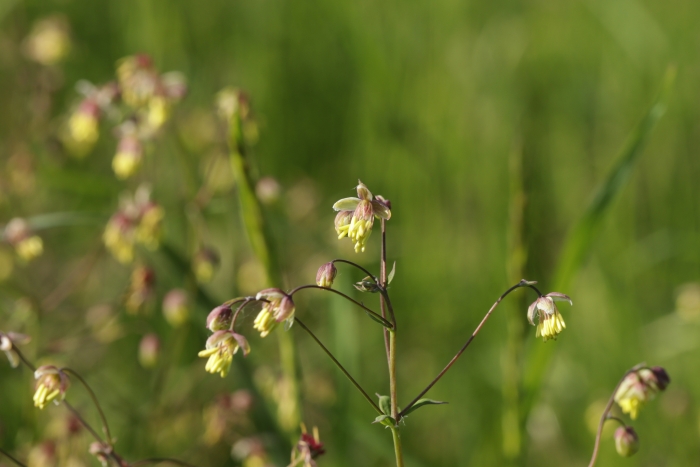Lesser Meadow-Rue
(Thalictrum minus)
Lesser Meadow-Rue (Thalictrum minus)
/
/

bjoerns
CC BY-SA 4.0
Image By:
bjoerns
Recorded By:
Copyright:
CC BY-SA 4.0
Copyright Notice:
Photo by: bjoerns | License Type: CC BY-SA 4.0 | License URL: http://creativecommons.org/licenses/by-sa/4.0/ | Rights Holder: bjoerns | Publisher: iNaturalist | Date Created: 2023-05-19T17:47:20-07:00 |






















Estimated Native Range
Summary
Thalictrum minus, commonly known as lesser meadow-rue, is a perennial herb native to a wide range of habitats including open woodlands, grasslands, and rocky slopes in Europe, Northwest Africa, Yemen, Ethiopia, South Africa, Southwest Asia, and Siberia. It is often found in calcareous grasslands, cliffs, and rocky gullies, typically at elevations between 5,200 to 9,800 feet. Lesser meadow-rue reaches approximately 0.98 feet (30 cm) in height and is characterized by its highly subdivided, fern-like, ternate to pinnate leaves. It produces delicate, small flowers that are usually yellow or greenish-white, appearing from late spring to early summer. The flowers are not particularly showy but have a subtle charm.
This plant is valued for its fine-textured foliage and its ability to thrive in challenging garden spots where other plants might struggle. It is suitable for rock gardens, borders, and wildflower meadows, where it can naturalize. Lesser meadow-rue prefers partial shade to full sun conditions and requires well-drained soil, ideally with some moisture. It is relatively low maintenance but may need protection from strong winds due to its delicate structure. While it contains the alkaloid thalidisine, it is not commonly known for any significant medicinal or culinary uses. Gardeners should be aware that it can self-seed prolifically under ideal conditions.CC BY-SA 4.0
This plant is valued for its fine-textured foliage and its ability to thrive in challenging garden spots where other plants might struggle. It is suitable for rock gardens, borders, and wildflower meadows, where it can naturalize. Lesser meadow-rue prefers partial shade to full sun conditions and requires well-drained soil, ideally with some moisture. It is relatively low maintenance but may need protection from strong winds due to its delicate structure. While it contains the alkaloid thalidisine, it is not commonly known for any significant medicinal or culinary uses. Gardeners should be aware that it can self-seed prolifically under ideal conditions.CC BY-SA 4.0
Plant Description
- Plant Type: Herb
- Height: 1-3 feet
- Width: 1-2 feet
- Growth Rate: Moderate
- Flower Color: Green, White
- Flowering Season: Spring, Summer
- Leaf Retention: Deciduous
Growth Requirements
- Sun: Full Sun, Part Shade
- Water: Medium
- Drainage: Medium
Common Uses
Border Plant, Butterfly Garden, Deer Resistant, Low Maintenance, Water Garden
Natural Habitat
Open woodlands, grasslands, and rocky slopes
Other Names
Common Names: Small Meadow-rue
Scientific Names: , Thalictrum minus, Thalictrum depauperatum, Thalictrum flexuosum, Thalictrum flexuosum, Thalictrum longipedunculatum, Thalictrum macrophyllum, Thalictrum majus var. arnaudi, Thalictrum minus var. genuinum, Thalictrum minus var. minus
GBIF Accepted Name: